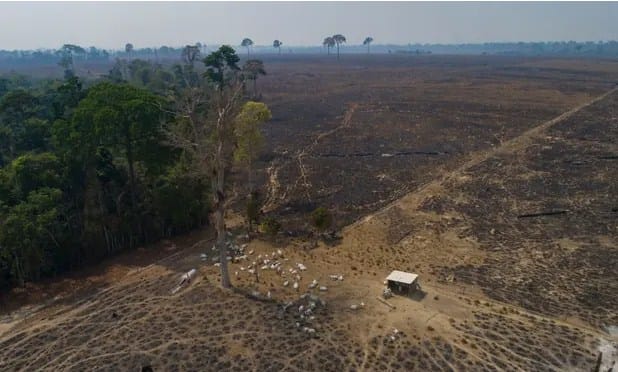Government data shows marked reduction against same period last year, reversing trend of destruction during Bolsonaro reign
After four years of rising destruction in Brazil’s Amazon, deforestation dropped by 33.6% during the first six months of President Luiz Inácio Lula da Silva’s term, according to new government satellite data.
From January to June the rainforest had alerts covering 2,650 sq km (1,023 sq miles), down from 4,000 sq km during the same period last year under former president Jair Bolsonaro. This year’s data includes a 41% plunge in alerts for June, which marks the start of the dry season when deforestation tends to jump.
“The effort of reversing the curve of growth has been reached. That is a fact: we reversed the curve; deforestation isn’t increasing,” João Paulo Capobianco, the environment ministry’s executive secretary, said during a presentation in Brasilia.
Capobianco noted that full-year results will depend on a few challenging months ahead. Still, the data is an encouraging sign for Lula, who campaigned last year with pledges to rein in illegal logging and undo the environmental devastation during Bolsonaro’s term.
The far-right leader weakened environmental authorities while his insistence on development of the Amazon region resonated with landgrabbers and farmers who had long felt maligned by environmental laws. They were emboldened, and Amazon deforestation surged to a 15-year high.
Thursday’s deforestation data comes from a system called Deter, managed by the National Institute for Space Research, a federal agency. It is an initiative mainly focused on detecting real-time deforestation. The most accurate deforestation calculations come from another system called Prodes, with data released only annually.
“Bottom line, we are prioritizing environmental law enforcement,” Jair Schmitt, head of environmental protection at Ibama, Brazil’s federal environmental agency, said in a phone interview with The Associated Press.
However, the continued shortage of personnel means the task hasn’t been easy, he said. Many Ibama agents retired and weren’t replaced during Bolsonaro’s administration, reflecting his effort to defang environmental authorities. Lula has committed to restoring the workforce, but the number of Ibama’s enforcement agents remains at its lowest in 24 years. For the entire country that is bigger than the contiguous U.S., there are just 700 agents, with 150 available for deployment.
Ibama has also strengthened remote surveillance, where deforestation is detected through satellite imagery, according to Schmitt. By cross-referencing with land records, it is possible to identify the owner of the area in many cases, leading to an embargo that restricts access to financial loans and imposes other sanctions.
Another strategy has been to seize thousands of illegally raised cattle within embargoed areas. It is effective because it inflicts immediate punishment, whereas fines are rarely paid in Brazil due to a slow appeals process, Schmitt said.
Rodrigo Agostinho, the head of Ibama, noted in the presentation Thursday that the value of fines imposed in the first half of the year jumped 167% from the 2019-2022 average, and the agency embargoed 2,086 areas — up 111%.
Improved deforestation data also reflect the change in rhetoric coming from the top, said Schmitt. Whereas Bolsonaro openly criticized Ibama and advocated for the legalization of deforested areas, Lula has said he will rebuild law enforcement and promised to expel invaders from protected areas.
It may be premature to celebrate the reversal in deforestation’s trend, however. According to satellite monitoring, there were 3,075 fires in the Amazon in June alone, which marks the beginning of the dry season — the most since 2007. The jump is due to the clearing of areas deforested in the second half of 2022, Schmitt said.
Source: https://www.theguardian.com/world/2023/jul/06/brazil-amazon-deforestation-lula
